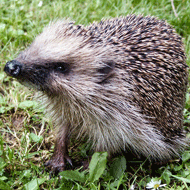Human sore throat bacteria identified in hedgehog

Scientists believe that the opportunities for direct and indirect contact between wild hedgehogs and humans could be a possible explanation for the finding.
The human sore throat pathogen, Streptococcis pyogenes, has been discovered in a wild hedgehog for the first time.
Scientists at the Zoological Society of London carried out a post-mortem examination on a free-living hedgehog found dead in northern England in June 2014. The examination confirmed the presence of S.pyogenes, which can cause sort throat or rash-like symptoms in people.
The strain was identified as emm 28, which can cause both superficial and invasive infections in humans and is similar to other strains of S.pyogenes. This is is the first time that S.pyogenes has been found in a hedgehog, or in any other free-living wild animal.
Scientists determined that the bacterium caused the death of the hedgehog, having likely entered the body via a tooth root abscess before spreading to other tissues.
The research, published in EcoHealth, suggests that the case may have resulted from the transfer of infection from human to hedgehog via antrhoponotic infection - a human disease which has been transferred to other animals - or reverse zoonosis.
It is believed that the opportunities for direct and indirect contact between wild hedgehogs and humans could be a possible explanation for the finding.
Author Lydia Franklinos, a wildlife veterinarian within ZSL’s Institute of Zoology, said: “While it is more common to hear about zoonotic diseases originating from wildlife, we rarely encounter disease transferring from human to animal, as appears to be the case here.
“While this is an isolated case, we need to be vigilant, and continue to monitor the threat to wildlife from humans and our activities. The hedgehog is in decline in the UK, and I would encourage further research on the pathogens of hedgehogs to better understand disease threats to the species in order to help conservation efforts.”
The post-mortem was carried out as part of Garden Wildlife Health - a project which aims to monitor the health of, and identify any disease threats, to wildlife in Britain.



 The BSAVA has opened submissions for the BSAVA Clinical Research Abstracts 2026.
The BSAVA has opened submissions for the BSAVA Clinical Research Abstracts 2026.